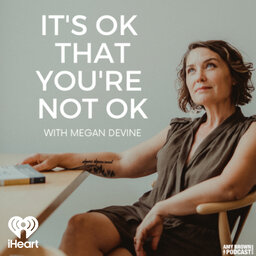The Old Gays Talk Life, Joy, and the Missing Generation of Gay Elders
Being fabulous can save your life.
The Old Gays are a social media sensation: flamboyant outfits, lip synched dance parties, and risque theatrics you might not expect of men in their 70s and 80s.
A lot of their media attention focuses on the joy they bring to all of us. But in their new book, The Old Gays’ Guide to the Good Life, they share a deeper story. This week on It’s OK, Bill, Bob, Mick, and Jessay talk about the missing generation of gay elders, and how being “discovered” late in life saved them.
In this episode we cover:
- Finding beauty inside immense suffering
- Why is it so hard to talk about devastating collective events - like AIDS and COVID - once the initial danger is over?
- The role of luck in surviving when so many did not
- Learning to love yourself first - at any age
- Chosen family and the power of being truly seen for who you are - in good times and bad
Looking for a creative exploration of grief? Check out the best selling Writing Your Grief course here.
Related episode:
What’s It All For? Loss and Meaning In Midlife with Chip Conley
Follow our show on Instagram, Facebook, Twitter, and TikTok @refugeingrief and @itsokpod on TikTok. Visit refugeingrief.com for resources & courses
About our guests:
The Old Gays are best friends Mick Peterson, Bill Lyons, Robert Reeves, and Jessay Martin. Flamboyant social media celebrities - @oldgays - they’ve also become educators, teaching people about the strides that have been made over the last five decades in the LGBTQIA+ community. Get their new tell-all group memoir, The Old Gays Guide to the Good Life: Lessons Learned about Love and Death, Sex and Sin, and Saving the Best for Last Find them on IG at @theoldgays and on TikTok at @oldgays.
About Megan:
Psychotherapist Megan Devine is one of today’s leading experts on grief, from life-altering losses to the everyday grief that we don’t call grief. Get the best-selling book on grief in over a decade, It’s Ok that You’re Not OK, wherever you get books. Find Megan @refugeingrief
Additional resources:
The San Francisco AIDS Foundation and UCSF house a lot of queer history related to the AIDS epidemic.
Want to talk with Megan directly? Join our patreon community for live monthly Q&A grief clinics: your questions, answered. Want to speak to her privately? Apply for a 1:1 grief consultation here.
Check out Megan’s best-selling books - It’s OK That You're Not OK and How to Carry What Can’t Be Fixed
Books and resources may contain affiliate links.
In 1 playlist(s)
It’s OK That You’re Not OK with Megan Devine
Life is full of difficult things, from tiny everyday disappointments to life-altering events. Everyo…Social links
Follow podcast
Recent clips

Protecting Your Mental Health in the Healthcare Workplace, with the Burned Out Burnout Expert, Dr. Jessi Gold
37:29

Over and Over Again: Illustrator Aubrey Hirsch on the Power of Storytelling
39:19

Untangled: Suffering & The 8-Fold Path with Koshin Paley Ellison
1:02:51
 It’s OK That You’re Not OK with Megan Devine
It’s OK That You’re Not OK with Megan Devine